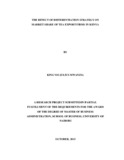| dc.description.abstract | This study sought to establish the extent of adoption of differentiation strategies and
their effect on market share of the tea export firms in Kenya. The study employed a
descriptivecross-sectionalsurvey design and the target population comprised of the
seventy two (72) active tea export firms in Kenya registered by the Tea Directorate, in
2014. Primary data was collected using semi-structured questionnaires that were
administered through drop-and-pick and e-mails correspondences. Sixty two (62) firms
out of the targeted 72 responded translating to 86.1% response rate.Secondary data was
obtained from the statistics of market share of the tea export firms between 2010 and
2014. Descriptive and inferential statistics were used in data analysis and the results were
presented in tables and graphs. The study found that the extent of adoption of
differentiation strategies ranges from 66.6% to 77.8% with the highest being valueadded
products strategy while the least was pricing. Amongst the value-added
strategies,product features (quality) is the most adopted strategy while certification is
the least applied strategy. The effect of differentiation strategies on market share of
the firms was low at 11.6%. This was an indication that the five differentiation
strategies under study were not necessarily being applied to influence the market
share. Additionally, other factors are being applied by the firms to influence market
share. It is recommended that the government should develop policies and strategies
that support the application of differentiation strategies among the Kenyan tea export
firms; that individual firms should adopt differentiation strategies that commandtheir
competitiveness in the global market; and that further research should be conducted
on other differentiation strategies that could affect market share of the tea export firms
in Kenya. Future studies could also seek to determinethe effect of differentiation
strategies on the market share within one market;use of differentiation strategies on
other sectors of the Kenyan economy;as well as strategies applied by tea export firms
from other countries in the region, for comparative analysis. | en_US |

